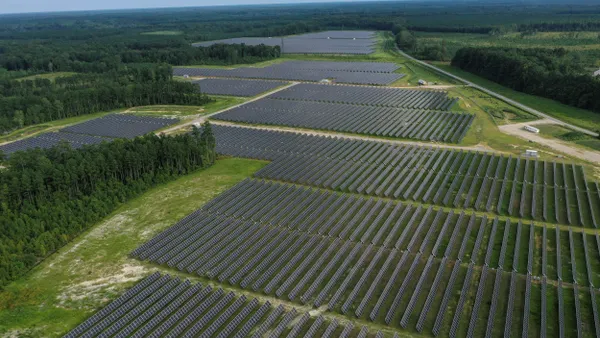Dive Brief:
- The Florida Supreme Court has rejected a request from solar industry advocates to remove a utility-backed solar amendment from the Nov. 8 ballot due to its language, the AP reports.
- Solar advocates asked the high court to nullify Amendment 1, arguing that a leaked recording dug up by the Miami Herald reveals the measure to be intentionally vague and deceptive.
- The groups asked the Florida Supreme Court to reopen its case involving the constitutionality of the proposed Amendment 1, and also initiated a separate court action in an attempt to declare that the Amendment 1 ballot language is unconstitutional.
Dive Insight:
With the election now four days away, solar advocates in Florida staged an 11th hour court challenge to block what they say is an intentionally deceptive amendment.
But the state Supreme Court on Friday rejected their petitions, allowing the proposed constitutional amendment to stand for a vote on Tuesday. It must be approved by 60% of voters to pass, and the AP notes 5.2 million votes have already been cast in the election.
“We are disappointed by today’s decision from the Florida Supreme Court as we know Amendment 1 to be a wolf in sheep’s clothing," Patrick Altier, president of the Florida Solar Energy Industries Association, said in a statement. "We strongly believe the proposed ballot measure is deceptive, and call upon the citizens of Florida to vote no Amendment 1.”
Florida's solar ballot initiative has become one of the country's more contentious energy issues that will be decided Tuesday.
The measure would ensure that third-party ownership of distributed solar remains illegal, essentially enshrining the utilities' monopoly over solar. A competing proposal that did not make it onto the ballot would have legalized third-party ownership of distributed solar.
Utilities have poured millions into the fight, supporting Consumers for Smart Solar, the political action committee leading their efforts. Last week, Florida Power & Light, Duke Energy and a other groups contributed $3.5 million to the PAC as polls showed support for Amendment 1 declining.
Sunshine State News reported support has fallen to just 60%, the minimum needed. And 28% oppose the measure, with 13% undecided. But solar advocates are using a news story that broke last month as its basis for its court challenge.
In October, the Miami Herald obtained an audio recording of James Madison Institute vice president Sal Nuzzo describing Amendment 1 as an "incredibly savvy maneuver" that could "completely negate anything [pro-solar interests] would try to do legislatively or constitutionally down the road."
Nuzzo essentially confirmed at an industry conference what solar advocates have long claimed: that utility interests used the amendment sought to confuse the voters by "using the language of promoting solar" to put in place so-called protections for non-rooftop solar users and push against third-party providers.
Utility-backed Consumers for Smart Solar have denied working with JMI.
"From the beginning we have made clear that Amendment 1 was offered as a better alternative to another proposed amendment that would have left consumers vulnerable to scams and forced them to subsidize out-of-state solar companies," a spokesperson told Utility Dive in an email. "JMI does not speak for our effort, and whatever this individual is claiming or taking credit for or claiming with in regard to Amendment 1 is simply not true."
But according to the solar group's court filing, the amendment is "affirmatively misleading," and they say utility-backed groups "withheld relevant and material information as to the objective and intended purpose of the amendment, and thereby misled this Court."
This post has been updated to reflect the Supreme Court's decision.














